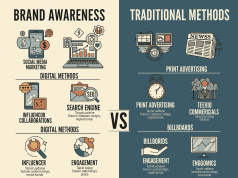Introduction
The marketing landscape is undergoing a profound transformation, driven by advancements in artificial intelligence (AI). As businesses strive to adapt to evolving consumer behaviors and preferences, integrating AI into marketing technology (martech) has emerged as a game-changer. By harnessing AI, companies can enhance customer engagement, streamline operations, and ultimately drive growth. This article explores the ways in which AI is revolutionizing customer engagement in the realm of marketing.
The Role of AI in Marketing
1. Personalization at Scale
One of the most significant advantages of AI in marketing is its ability to personalize customer experiences. Machine learning algorithms analyze vast amounts of data to understand individual preferences, behaviors, and needs. This enables brands to tailor their messages and offerings, providing customers with relevant content that resonates deeply.
For instance, retailers can use AI to recommend products based on a customer’s shopping history, leading to increased conversions. According to a report by McKinsey, businesses that excel in personalization can see a revenue increase of up to 10-30%.
2. Predictive Analytics
Predictive analytics, powered by AI, allows marketers to anticipate customer behaviors and trends. By analyzing historical data, AI can identify patterns and predict future actions, such as when a customer is likely to make a purchase or engage with a brand.
This capability empowers businesses to optimize their marketing campaigns. For example, a travel company can analyze past booking behaviors to forecast peak seasons, allowing for targeted promotions that align with consumer demand.
3. Chatbots and Conversational AI
AI-driven chatbots are revolutionizing customer service and engagement. These virtual assistants can handle inquiries 24/7, providing instant responses to customer questions and concerns. This immediacy not only enhances customer satisfaction but also reduces the workload on human agents.
A study by Gartner indicates that by 2025, 75% of customer service interactions will be handled by AI. This shift allows businesses to offer more seamless and efficient customer experiences, fostering loyalty and engagement.
4. Enhanced Customer Insights
AI tools can extract valuable insights from customer data that would be impossible to analyze manually. By utilizing natural language processing (NLP) and sentiment analysis, marketers can glean understanding from social media interactions, reviews, and feedback.
These insights help businesses refine their strategies and better connect with their audience. For example, by analyzing customer sentiment around a product launch, a company can adjust its marketing approach in real time, maximizing impact.
5. Automating Marketing Processes
AI can streamline marketing workflows through automation, reducing repetitive tasks and allowing marketers to focus on strategy and creativity. Marketing automation platforms can use AI to optimize email campaigns, manage social media postings, and even adjust ad spend in real time based on performance metrics.
This not only enhances efficiency but also improves the accuracy of campaigns, ensuring that resources are allocated effectively.
Challenges of Integrating AI in Marketing
While the benefits of integrating AI into marketing are substantial, challenges remain. Data privacy concerns, the need for quality data, and the potential for biased algorithms must be addressed. Additionally, there is a learning curve for marketers to effectively leverage these technologies.
Companies must invest in training and resources to ensure their teams can harness AI’s full potential. Collaborating with data scientists and AI experts can help bridge this gap and pave the way for successful integration.
Conclusion
The integration of AI in marketing technology signifies a transformative shift in how businesses engage with customers. By leveraging AI’s capabilities in personalization, predictive analytics, customer insights, and automation, companies can enhance customer experiences, foster deeper relationships, and drive growth.
As this technology progresses, early adopters will have a competitive edge in understanding and meeting customer needs. While challenges persist, the potential for AI to revolutionize customer engagement is undeniable. By embracing these advancements, businesses can position themselves for success in an increasingly digital world.









